The Rite
 for disturbing thematic material, violence, frightening images, and language including sexual references.
for disturbing thematic material, violence, frightening images, and language including sexual references.
Reviewed by: Rev. Bryan Griem
CONTRIBUTOR
| Moral Rating: | Offensive |
| Moviemaking Quality: |
|
| Primary Audience: | Adults |
| Genre: | Supernatural Thriller Drama |
| Length: | 1 hr. 52 min. |
| Year of Release: | 2011 |
| USA Release: |
January 28, 2011 (wide—2,900+ theaters) DVD: May 17, 2011 |
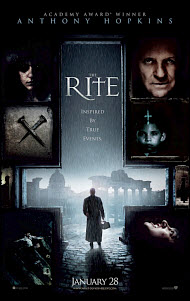

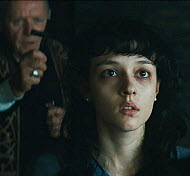
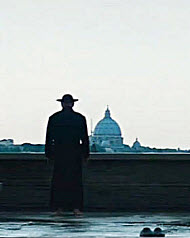
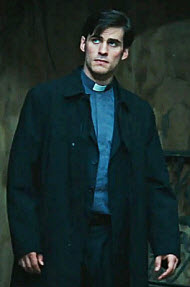
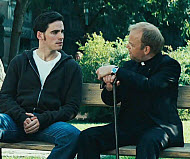
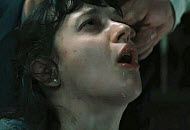
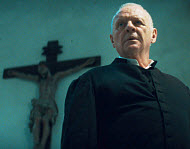
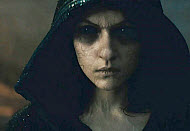
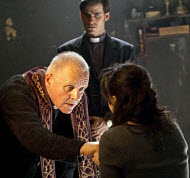
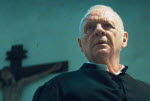
Exorcism in the Bible
Demons in the Bible
Is Satan a real person that influences our world today? Is he affecting you? Answer
DEMON POSSESSION and Influence—Can Christians be demon possessed? In what ways can Satan and his demons influence believers? Answer
FEAR, Anxiety and Worry… What does the Bible say? Answer
| Featuring |
|---|
|
Anthony Hopkins … Father Lucas Rutger Hauer … Istvan Kovak Alice Braga Angeline Ciarán Hinds … Father Xavier See all » |
| Director |
| Mikael Håfström—“1408,” “Derailed” |
| Producer |
| Contrafilm, Fletcher & Company, New Line Cinema, Robert Bernacchi, Christy Fletcher, Beau Flynn, Mark Tuohy, Gian Paolo Varani, Tripp Vinson |
| Distributor |
“You can only defeat it when you believe.”
Exorcist cast thyself. That phrase might best describe the theme of this movie. Two priests, one an unbeliever (actor Colin O'Donoghue, portraying priest apprentice Michael Kovak) who entered seminary to work out his own “demons” of unbelief, and another (actor Anthony Hopkins, portraying Father Lucas Trevant) who spends his advancing years looking after his truly demon-possessed neighborhood, only to finally catch the dark spiritual contagion in his own body. Good theatrical work by all the actors may be acknowledged at the outset.
At one point Hopkins alludes to another movie, The Exorcist, belittling its pea-soup vomiting scene and the 360° head spinning moments, yet The Rite simply replaces them with a solid-object spew of crucifixion symbols and a merely toned down (more believable?) version of the neck-wrenching sequence.
As with most of these exorcism-type films, it is again the Roman Catholic Church that is called upon to handle the situation, and everything seems to work out in the end because they answered the beacon. The audience is even apprised of the ongoing efforts of the theatrically depicted priests today in the real world, and the message is that all this stuff is currently happening on a fairly regular basis, but being handled by your friendly neighborhood padre. Be afraid!
My problem is severalfold. First, I recognize a serious error in Roman Catholicism which denies the Gospel message of salvation by faith alone. This was a doctrine clearly denounced by the Roman church during the Counter Reformation pronouncements at Trent (6th Session, Canons Concerning Justification, January 1547) and it is then that Protestants concluded it ceased to be a true church. If accurately assessed, why would the keepers of a false Gospel, one contrary to God, have any heavenly authority against manifesting demons which are also divinely antithetic?
Second, the star of the show is a young agnostic priest-to-be who lumps the notion of God with that of extraterrestrials. He is the one who eventually confronts Satan face-to-face, only to have his convictions stirred and belief ignited. We might imagine that experiencing what the movie depicts would make a believer out of any of us, and it would, but how would it really occur? In the Bible, some non-Christian magicians tried to do an exorcism and got their tuckuses handed to them (Acts 19:13-20), so how does that comport with “The Rite”?
In the movie, the rather dull demon is tricked into causing faith in the unbelieving priest, which invariably leads to his calling upon God. Ergo, the priest is now a true believer and has the requisite power over the foolish demon that led him to this point. The demon announces his name, Ba’al (which was the Canaanite’s primary idol in the Bible) and having his identity revealed, was at the mercy of the priest who summarily cast him out. Are angelic creatures really so dim?
Thirdly, where biblically do we find exorcism recipes? Demonic encounters were generally dealt with once-for-all and with merely a word by Christ or the Apostles. The movie, of course, has all sorts of religious rigmarole that constitutes a proper “rite,” and these include crucifixes, saint cards, holy water, candles, incantations, rosaries, and sundry other accoutrements. Nobody seems to be exorcised in singular encounters, either, so there are repeated castings out of the same demons time after time. Again, not biblical.
The off-color language in the movie runs the gamut, and includes most everything, but it wasn’t a constant barrage, and was often so quick that one wasn’t certain what was said. Of note, most of the language came from the religious figures, and it included a variety of penis references by synonymous slangs. The f-word was used, sh** a few times, and there was the calling of a woman by the acrimonious term for a female dog. “Hell” is uttered as an expletive, and the demon-possessed pregnant woman pulls her skirt up and requests the priest to rape her. She shows little in the way of skin, but bleeds all over the place in the hospital, and there are a couple of rough traffic accident sequences ending in bloody fatality.
The film has a spooky feel over all, and is not bad at delivering that agenda. But where truth and error lie may be found in Scripture. We do not see true Christians ever being possessed in the Bible. Why is that? Because they are possessed by God (1Cor. 6:19-20). God cannot be evicted, and demons are his inferior creatures. When we see a demon-possessed priest we have to ask, “was he ever saved?” After all his exorcisms in the name of God, he gets possessed himself? That seems rather unbiblical (and ridiculous) and if so, incorrect. It’s Hollywood after all, so what should we expect? What would the Vatican expect? Hmmm.
There are some unsettling scenes in a mortuary with the cadavers there; discomfort with the pregnant victim pounding her own tummy, and an all-so-common-these-days “man-at-a-urinal” scene. Smoking cigarettes is commonplace (it is Rome, after all) and there are some lewd allusions uttered by the demon legion.
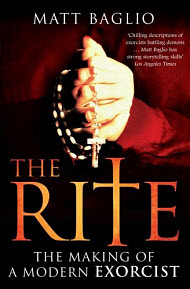
The good of the film may come from a stirred conviction to prayer, to knowing what Scripture actually says, and to not be slack as a Christian. It may also place wonder in the thoughts of atheists, since the movie puts forth demons as a reality, but it definitely forces the faithful to check Scripture references (which they will find are more often than not, poorly applied in this script).
The movie is a mediocre thrill-ride and not much more. When it concludes, you’ve had your fix, and you probably won’t be lining up again to see what will certainly be available as a rental—perhaps for next Halloween. Amen.
Violence: Moderate / Profanity: Moderate / Sex/Nudity: Minor
See list of Relevant Issues—questions-and-answers.


Hopkins and the other actors did a brilliant job carrying these messages through. Foul language/attitude fits in this film, as it is one with the devil as a central target.
A brief word about the reviewer’s comments regarding the Catholic Church’s lack of authority to exorcise demons: to ridicule the Church’s efforts to rid evil from tortured souls due to a different doctrinal belief is neither proper for a film review, nor is it honest. The Church, although all Her members are sinners (like everyone else in this world), has the authority to exorcise because She has been performing the rite for centuries. Also, the rite works. If only more people did their homework and read up on the topic, they would find that truth. Regarding the film, it is excellent, if only you have the stomach to get through disturbing scenes where the devil is seemingly impenetrable.
Moral rating: Average / Moviemaking quality: 4½
1st. This movie really illustrates to me the importance of not being a luke warm fence sitter. You have to stand for something. Constantly balancing yourself in the “politically correct” middle will only leave you lost.
2nd. So many times we fail to understand the series of events that leads us down our journey. We should be willing to embrace the lessons that God places in front of us. There were more, very specific truths that were “spoken” to me as I watched this film.
I enjoyed the movie very much. I felt it was well done. However, I enjoyed the lessons that God taught me within the movie. So, when you go to see this film, be open to other lessons God might be speaking to you.
Moral rating: Average / Moviemaking quality: 4½
I still give the movie the highest marks, as its theme is strongly Christian, and its about the faith recovered with a strong emphasis on the necessity of faith. It has some scary scenes and gory moments, including the mortician’s tips on trade. Still, the movie is highly recommendable
Moral rating: Better than Average / Moviemaking quality: 5
I really got a strong sense of the creepiness, deceits and pure evil of Satan and the real-modern-world struggles of the main characters. Other than being a little slow, it is a well-made, thoughtful film. Definitely not for children or young teenagers.
Moral rating: Average / Moviemaking quality: 4½
The impact of the movie for me is that possession is real and the devil will stop at nothing to get your soul. Possession is the devil physical manifestation, and to a young child, especially one who often sleep talks in his nightmares, can be damaging. I will discern more about future film when I planned to take my nephew with me.See all »
Moral rating: Average / Moviemaking quality: 4
The transition (***spoiler***) of Father Lucas Trent going from a Catholic Priest exorcising demons for many years to being possessed by Baal was sudden, unexpected and well unconvincing, although there were hints early on that not all was well with his spirit. See all »
Moral rating: Offensive / Moviemaking quality: 4

That said, my teenage son and I thought that it was relatively mild and conveyed human weaknesses and sin rather than being gratuitous. We were surprised at how many positive things we found in the movie. Pleased at the many Scriptural references accurately incorporated. Anthony Hopkins portrayal of the experienced but battle weary exorcist was excellent.
Some brilliant lines, such as “Just because you chose not to believe in the devil, that doesn’t protect you from him.” The student priest was portrayed honestly well as caring, struggling, and human. Refreshing to see so many people of faith in a movie. While some disturbing scenes and effects might be dismissed as typical Hollywood, we saw them employed as a way to visually represent the characters spiritual discernment and growing awareness of the reality of evil. How can you convey discernment? I was encouraged by the questions and insightful discussions about Biblical passages on the topic that my teenage son brought up after the movie. We both agreed it was surprisingly well done and recommend it.
***SPOILER*** on the question of a Christian priest being possessed, my son made the connection between his reaction to the death of the girl he tried to help and a conversation he had earlier with the young apprentice. He said that he understood doubt because he had lost his faith when a possessed boy committed suicide. My son concluded that because of the girls death, the priest had once again lost faith, was angry at God, or doubted so much that it gave the demon a foothold. Because one theme of the movie is the difference between a rite/ritual and true faith behind it, the lack of faith or apostasy was an open door to an agent of the devil.
My Ratings: Moral rating: Better than Average / Moviemaking quality: 4